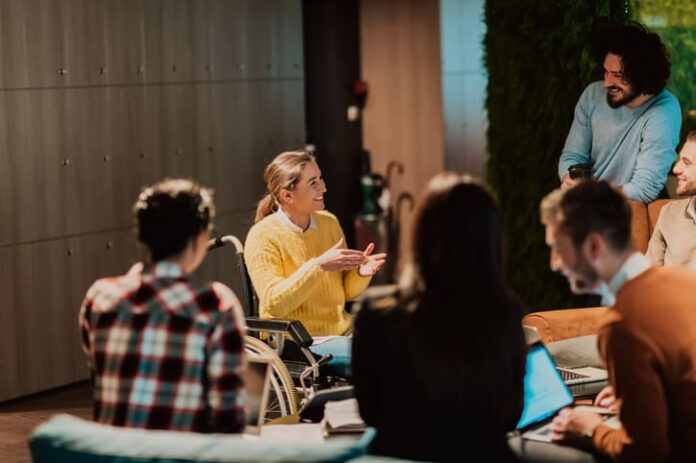By Charlotte Roberts
Gone are the days of a ‘one-size-fits-all’ workplace, and as businesses strive to innovate and adapt, neurodiversity works as a powerful catalyst for change in the modern-day workplace.
Today’s workforce is shifting away from the idea that employees must adhere to the same working style. One in seven people now identify as neurodivergent, and companies need to stay ahead of the curve and recognise the unique strengths that neurodiverse employees bring to the table.
Embracing Neurodiversity as a business opportunity
Whether it’s autism, ADHD, dyslexia, or other neurological variations, neurodiversity offers businesses unique perspectives and skills that can significantly enhance business performance.
It’s found that neurodiversity presents workers with abilities to hyper-focus, creative problem solve, and have exceptional attention to detail, approaching problems from fresh and often unexpected angles. For example, workers with autism may excel in tasks that require deep concentration, pattern recognition or systematic thinking, making them valuable in fields like software development and engineering.
Similarly, those with ADHD have tendencies that allow them to perform exceptional brainstorming and work best in a fast-moving environment. Especially in an ever-changing tech landscape, these capabilities are crucial to how neurodiversity can translate to business success in sectors like data and analytics, tapping into new potentials and adaptabilities of the modern workplace.
Harnessing neurodiversity requires organisations to implement the right everyday practices, that can push talent to unlock their full potential. Different methods will suit different people, for example, some employees may need extra breaks, or reduced sensory stimuli through having quiet areas in the office where they can decompress. Others will need further support like having logical guides on goals that break down thorough processes and improve manageability. Organisations need to grasp these strategies and embed them within their working culture, as this support is what will produce high-performing employees across the workforce.
Creating this environment where neurodiversity is recognised, respected, and valued, means businesses can unlock a wealth of untapped potential, simultaneously driving innovation and employee engagement, and pushing toward overall business success.
Building a neurodiverse-friendly organisation
Building a neurodiverse-friendly organisation is much more than a ‘tick-box’ exercise. Organisations that have the right policies in place embody a company ethos that puts the employee first and recognises differences as strengths. These policies include flexible hours, remote working, job sharing, or other arrangements that support the needs of the employee so they can be a productive and successful member of the team. Policies like these build a culture of inclusion and signal to staff that diversity and individuality are valued and ultimately celebrated.
Gen Z is the next pool of talent, and with over half identifying as somewhat neurodiverse, companies need clear communication to maintain expectations, and support during onboarding so neurodivergent hires integrate more seamlessly.
Inclusive recruitment involves redesigning job descriptions to focus on essential skills rather than rigid requirements and adjusting interview processes to be more flexible to the needs of neurodiverse individuals.
Diversity of thought is a key driver of innovation, and businesses need to foster environments where neurodivergent employees can harness their unique strengths, such as creative problem-solving, lateral thinking, and exceptional attention to detail. Essentially, this will enhance both employee well-being and overall business performance- a win-win for all.
The role of leadership
Businesses need to get their messaging right to remind employees that neurodiversity is an integral part of the company, not just an afterthought. This is achieved through a ‘top-down’ approach, where leaders understand how neurodiversity can be leveraged for positive change and how to feed this message through the workforce.
It all boils down to three key practical takeaways for leaders on how they can support their neurodiverse workforce; through education, inclusive recruitment, and ongoing support. Leaders need to provide comprehensive training for themselves and their teams to reduce stigma and nurture talent effectively throughout their careers. This can be done through encouraging open dialogue, offering flexible working schedules, regular mentorship programmes, and providing workspaces that are tailored to the needs of individuals. These factors work hand in hand to create a workforce that welcomes neurodiversity and acknowledges the benefits of having neurodiverse employees.
Employee well-being needs to be at the forefront of employers’ minds, and with 70 per cent of neurodiverse employees suffering from poor mental health, serious support needs to be offered and accessible to the workforce. Businesses need to offer tailored mental health support and provide training for managers to better understand and support neurodiverse employees.
Neurodiversity is the future of work, and it needs to be at the heart of what organisations do if they want to drive change in today’s landscape. If understood and nurtured correctly, neurodiversity can be a catalyst for change and challenge traditional ways of thinking, reshaping norms, systems, and approaches to break down barriers and expand our knowledge of neurodiversity as a business advantage.




































